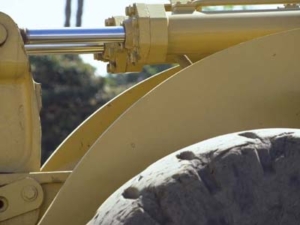 A Northampton County Man, who lost both of his legs after he was run over by a piece of heavy equipment machinery while working in a landfill, received a $16.25 million global settlement from his employer and the manufacturer of the equipment in Philadelphia Common Pleas Court.
A Northampton County Man, who lost both of his legs after he was run over by a piece of heavy equipment machinery while working in a landfill, received a $16.25 million global settlement from his employer and the manufacturer of the equipment in Philadelphia Common Pleas Court.
Scott Skirpan, 50, was working for a landfill in Easton, Northampton County, as a spotter for garbage equipment dumping their loads and compacting garbage when he was run over by a 60,000-pound Caterpillar 973 track loader and left by his fleeing co-workers without aid, according to the plaintiffs’ mediation memorandum in Skirpan v. Caterpillar Inc.
Skirpan had to call 911 himself from his cell phone with both of his crushed legs trapped under the track loader, the plaintiffs’ memorandum said.
Following the May 1, 2006 accident, Skirpan’s legs were both amputated at the hip, and his right hip also had to be removed, plaintiffs’ papers said.
Skirpan and his wife, Carole, sued landfill owner, Chrin Brothers Inc., other related corporate entities and the driver of the track loader on the basis that Skirpan was assigned to work in one of the landfill’s most dangerous jobs without any training, plaintiffs’ papers said. And the Skirpans sued Caterpillar Inc. on the basis that the track loader manufactured by Caterpillar lacked the safety features necessary to prevent accidents like the one that cost Skirpan his legs.
Chrin Brothers and the other related defendants settled the case for $12 million and Caterpillar settled the case for $4.25 million, according to both plaintiffs’ and defense counsel in the case.
The case settled after trial started with Judge Gregory E. Smith presiding. Caterpillar settled June 29, while the Chrin defendants settled first on June 25.
Skirpan was hired by a related business entity, Chrin of Delaware, as a cement finisher on construction sites, court papers said. He was transferred to Chrin Brothers, the landfill operator and a separate business entity from Chrin of Delaware, because of a back injury, and he began work as a spotter for garbage trucks backing up to the area in the landfill to dump their loads.
On Skirpan’s third day at the job, employee Ramon Lorenzo-Nunez reversed a track loader, which pushes the garbage dumped by the trucks into place, and did not look out for Skirpan while he sought to avoid a gas pipe to his right, plaintiffs’ papers said. Skirpan, meanwhile, had his back to the track loader and his attention focused on guiding a trash track before he was run over.
Plaintiffs’ expert Neal Bolton, a landfill operations expert, said the spotter job is dangerous because of the spotter’s proximity to heavy equipment like trash trucks and earth-moving machinery, and many landfills have eliminated the position entirely, the plaintiffs’ memorandum said.
Michael A. Boomsma, a defense counsel for Chrin of Delaware, confirmed the settlement. Boosma, however, declined further comment on the case. Thomas A. Kuzmick and Valerie Kellner of Rawle & Henderson, defense counsel for Chrin Brothers, Lorenzo-Nunez and another Chrin Brothers employee, could not be reached for comment. Caterpillar’s defense counsel, James H. Keale and Thomas Robertson of Sedgwick LLP in Newark, N.J., and William J. Conroy and Tiffany M. Alexander of Campbell Campbell Edwards & Conroy in Wayne, Pa., also could not be reached for comment.
Plaintiffs’ counsel were Slade H. McLaughlin and Paul A. Lauricella of McLaughlin & Lauricella, P.C. in Philadelphia.
Chrin of Delaware said in its defense memorandum that while Skirpan was working under the control of Chrin Brothers, it was still immune from civil liability under the Workers’ Compensation Act as the injured worker’s employer. Chrin of Delaware also argued that it did not have the duty to train Skirpan for his work at the landfill and Chrin of Delaware was a distinct company working in a distinct industry. Chrin Brothers said in its defense memorandum that Skirpan’s claims against Chrin Brothers, Lorenzo-Nunez and Thomas McMonigle, the landfill’s engineer, were barred under the Workers’ Compensation Act because Skirpan was a “borrowed servant” from Chrin of Delaware.
Chrin of Delaware and Chrin Brothers said in their memos they have a total of $12 million in insurance coverage.
Caterpillar said in its defense memorandum the “adequacy of rear visibility” in the track loader was not the reason for Skirpan’s accident, but that Skirpan was run over because Skirpan and Lorenzo-Nunez did not look out for each other.
There were real concerns that Skirpan might have to overcome contributory negligence in the case, McLaughlin said, because the defense could have argued that any reasonable person would have felt “this behemoth, big, 60,000-pound machine bearing down on him.”
Chrin of Delaware, Skirpan’s employer, said it lent Skirpan’s services to Chrin Brothers, which owned the landfill. But the Chrin defendants couldn’t show Skirpan had consented to being “borrowed” under the borrowed-servant doctrine because, Lauricella said, all Chrin employees believed the Chrin enterprises were one big operation, Lauricella said.
The Chrin enterprises are, however, divided into three separate corporations, Lauricella and McLaughlin said.
So even though a workers’ compensation lien of $1.1 million is to be taken out of the settlement, neither of the Chrin defendants were able to meet the threshold of claiming Skirpan as their employer under workers’ compensation immunity, McLaughlin and Lauricella said.
And in the strict products liability case against Caterpillar, the plaintiffs said in their papers that the track loader did not have any rearview mirrors mounted on the side, rear cross-view mirrors or a closed circuit video monitoring system to give rear visibility to the track loader driver without requiring a driver to look over his or her shoulder.
Skirpan’s future medical expenses are estimated at $2.1 million and economic damages of lost earning capacity are between $517,000 and $1 million, papers said.
Defendant, Giles & Ransome, the distributor of the track loader, was defended by Caterpillar, Lauricella said. Defendant Chrin Hauling was dismissed from the case on summary judgment, Lauricella said.



